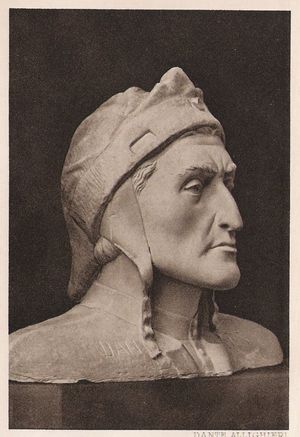Divine Comedy
From AnthroWiki

The Commedia by Dante Alighieri, later called Divina Commedia - the Divine Comedy - by Giovanni Boccaccio, has had a lasting influence on European literature like hardly any other work. After his banishment from Florence in 1302, Dante had settled in Ravenna, where he probably began work on the Divina Commedia, written in the Italian popular language, in 1307[1] and only completed it shortly before his death in 1321. According to Boccaccio, the last 13 cantos of the Paradiso were only found 8 months after Dante's death by his son Jacopo[2].
Literature
- Giovanni Boccaccio, Otto von Taube (Translator): Das Leben Dantes, Insel Verlag, Leipzig 1909 pdf
- w:Giovanni Boccaccio: Das Leben Dantes, Übertragen von Edmund Theodor Kauer, Deutsche Buchgemeinschaft, Berlin
- Karl Vossler: Die göttliche Komödie. Entwicklungsgeschichte und Erklärung. Carl Winter, Heidelberg 1907/1910. I. Band I. Teil I. Band II. Teil II. Band I. Teil II. Band II. Teil
- Robert L. John: Dante, Springer-Verlag, Wien 1946, ISBN 978-3-211-80023-2
- Arthur Schult: Dantes Divina Commedia als Zeugnis der Tempelritter-Esoterik, Turm-Verlag, Bietigheim 1979, ISBN 978-3799901840
- Joseph P. Strelka: Dante und die Templergnosis, A. Francke Verlag, Tübingen 2012, ISBN 978-3772084430
- Al-Ma'arri, Gregor Schoeler (Übers.): Paradies und Hölle. Die Jenseitsreise aus dem „Sendschreiben über die Vergebung“, Verlag C.H. Beck 2002, ISBN 978-3406484469
- Muhyiddin Ibn Arabi, Franz Langmayr (Übers.), Wolfgang Herrmann (Translator): Reise zum Herrn der Macht: Meine Reise verlief nur in mir selbst, Chalice Verlag 2008, ISBN 978-3905272734
- Milena Rampoldi: Vergleich zwischen der Anschauung des Paradieses in Abu l-'Ala al-Ma'arri und Dante Alighieri, epubli GmbH 2014, ISBN 978-3844281422
- Dante Alighieri: Die Göttliche Komödie, Übersetzung von Hans Werner Sokop in Original-Terzinen mit Erläuterungen. 100 Bilder von Fritz Karl Wachtmann., Akad. Druck- und Verlagsanstalt, Graz 2014, ISBN 978-3-201-01994-1
- Dante Alighieri, Kurt Flasch (Übers.): Commedia: In deutscher Prosa von Kurt Flasch, FISCHER Taschenbuch, 2015, ISBN 978-3596905959
- Dante Alighieri: Die Göttliche Komödie. Nacherzählt von Kilian Nauhaus. Dohr, Köln 2013, ISBN 978-3-86846-107-7
- Dante Alighieri, Hartmut Köhler (Übers.): La Commedia / Die Göttliche Komödie: Drei Bände in Kassette. Italienisch/Deutsch, Philipp Reclam jun. Verlag, Stuttgart 2012, ISBN 978-3150300459
- Dante Alighieri, Georg Hees (Übers.): Divina Commedia Inferno, Kooperative Dürnau 1995, ISBN 978-3-8886-1041-7
- Dante Alighieri, Georg Hees (Übers.): Divina Commedia Purgatorio, Kooperative Dürnau 1995, ISBN 978-3-8886-1042-4
- Dante Alighieri, Georg Hees (Übers.): Divina Commedia Paradiso, Kooperative Dürnau 1995, ISBN 978-3-8886-1043-1
- Dante Alighieri: Die göttliche Komödie. Aus dem Italienischen von Philaletes (König Johann von Sachsen). Mit zahlreichen Bildern von Gustave Doré. Mit einer kleinen Abhandlung zum Lobe Dantes von Giovanni Boccaccio., Diogenes Verlag, 1998, ISBN 978-3257219104
- Romano Guardini: Dantes Göttliche Komödie: Ihre philosophischen und religiösen Grundgedanken, Matthias-Grünewald-Verlag, Mainz 1998, ISBN 978-3-7867-2129-1
- Romano Guardini: Der Engel in Dantes Göttlicher Komödie. Dantestudien Band 1, Matthias-Grünewald-Verlag, Mainz 1995, ISBN 978-3786718635
- Romano Guardini: Landschaft der Ewigkeit. Dantestudien Band 2, Matthias-Grünewald-Verlag, Mainz 1996, ISBN 978-3786719021
- Kurt Flasch: Einladung, Dante zu lesen, FISCHER Taschenbuch, 2015, ISBN 978-3596905966
- Fritz R. Glunk: Dantes Göttliche Komödie - Einführung und Originaltext für alle Fans von INFERNO, Bastei Lübbe, 2013 (Kindle Edition), ASIN: B00CM58QHU
- Leonardo Olschki, Bernd Payer (Translator): Der Mythos vom Filz, University of California, Berkeley und Los Angeles 1949
- Willem Frederik Veltman: Dantes Weltmission, J. Ch. Mellinger Verlag, Stuttgart 1979, ISBN 978-3-88069006-6
- Richard Lansing (Hrsg.): The Dante Encyclopedia, Taylor & Francis e-Library, 2010, ISBN 0-203-83447-X Master e-book ISBN
- Theophil Spoerri: Einführung in die Göttliche Kommödie, Speer-Verlag Zürich, 1946
- Rudolf Steiner: Metamorphosen des Seelenlebens - Pfade der Seelenerlebnisse, Zweiter Teil, GA 59 (1984) English: rsarchive.org German: pdf pdf(2) html mobi epub archive.org
- Rudolf Steiner: Die Tempellegende und die Goldene Legende , GA 93 (1991), ISBN 3-7274-0930-4 English: rsarchive.org German: pdf pdf(2) html mobi epub archive.org
- Rudolf Steiner: Ursprungsimpulse der Geisteswissenschaft, GA 96 (1989), Berlin, Ostermontag, 16. April 1906
- Rudolf Steiner: Das christliche Mysterium, GA 97 (1998), ISBN 3-7274-0970-3 English: rsarchive.org German: pdf pdf(2) html mobi epub archive.org
- Rudolf Steiner: Mitteleuropa zwischen Ost und West, GA 174a (1982), ISBN 3-7274-1741-2 English: rsarchive.org German: pdf pdf(2) html mobi epub archive.org
- Rudolf Steiner: Esoterische Betrachtungen karmischer Zusammenhänge, Sechster Band, GA 240 (1986), Arnheim, 18. Juli 1924
- Rudolf Steiner: Die okkulte Bewegung im neunzehnten Jahrhundert und ihre Beziehung zur Weltkultur, GA 254 (1986), ISBN 3-7274-2540-7 English: rsarchive.org German: pdf pdf(2) html mobi epub archive.org
- Rudolf Steiner: Vom Leben des Menschen und der Erde. Über das Wesen des Christentums, GA 349 (1980), ISBN 3-7274-3490-2 English: rsarchive.org German: pdf pdf(2) html mobi epub archive.org
 |
References to the work of Rudolf Steiner follow Rudolf Steiner's Collected Works (CW or GA), Rudolf Steiner Verlag, Dornach/Switzerland, unless otherwise stated.
Email: verlag@steinerverlag.com URL: www.steinerverlag.com. Index to the Complete Works of Rudolf Steiner - Aelzina Books A complete list by Volume Number and a full list of known English translations you may also find at Rudolf Steiner's Collected Works Rudolf Steiner Archive - The largest online collection of Rudolf Steiner's books, lectures and articles in English. Rudolf Steiner Audio - Recorded and Read by Dale Brunsvold steinerbooks.org - Anthroposophic Press Inc. (USA) Rudolf Steiner Handbook - Christian Karl's proven standard work for orientation in Rudolf Steiner's Collected Works for free download as PDF. |
References
- ↑ Giovanni Boccaccio, Dante's first biographer, claimed that Dante had already begun the first 7 cantos of the Inferno before his banishment, but then had to leave them behind. Later, around 1307, they were found and sent to him. Marchese Moruello, with whom Dante was living at the time, was so enthusiastic about them that he asked Dante to continue his work. Boccaccio cites as the only evidence that the eighth canto begins with the words: "I say, going on, that much earlier...".
